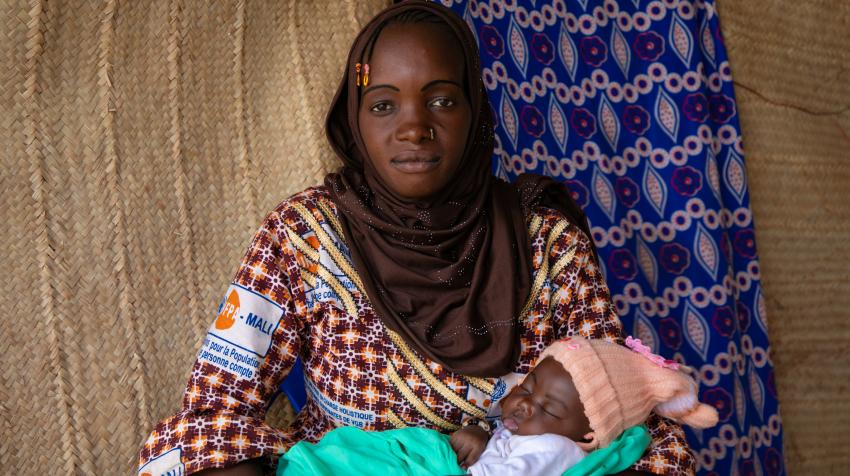From Vol. XLIV, No. 2, "Green Our World!", 2007
If there is one issue that strikes at the heart of my nation, Tuvalu, it is climate change. Tuvalu is a small coral atoll nation located in the middle of the South Pacific. Our lives are closely linked to the marine environment and we live off the bounty of the ocean, with fish being our main source of protein.
The islands are very narrow: Funafuti, the capital, is a mere 600 metres wide at its widest point and the land is less than 2 metres above sea level. We are very conscious of the sea that surrounds our small islands and now also of climate change.
We must carefully use the small amounts of freshwater that lie underneath the atolls. We cautiously dig small pits to reach the freshwater in the ground so that we can grow pulaka (a root crop sometimes called taro) and save every drop of rain that falls. Tragically, our environment is changing. The old people have noticed the changes, beaches have disappeared, small islets have been washed away, coral reefs are starting to die and crops are dying from salt-water intrusion. The recent report of the Intergovernmental Panel on Climate Change (IPCC) confirmed all these observations and predicted worse to come. As the temperature of the oceans increases, more corals will die. Sea levels will rise and severe storms will get far worse. Tuvalu faces a very uncertain future.
While we share responsibility for protecting our own environment, the impacts of climate change are caused by emissions from countries many thousands of kilometres away. We are at the mercy of the international community. For this reason, Tuvalu has been very active in climate change negotiations and has actively participated in recent discussions in the UN Security Council. For a small island developing State like Tuvalu, this is a security issue of immense proportions. Though difficult to comprehend, it is possible that our entire nation could disappear as a result of climate change. As was stated by Tuvalu's Ambassador to the United Nations, Afelee Pita, to the Security Council in early 2007, the climate change impact is an unprecedented threat to our nationhood. It is an infringement of our fundamental rights to nationality and statehood, as constituted under the Universal Declaration of Human Rights and other international conventions.
Tuvalu joined the United Nations on 5 September 2000, firmly believing in the Organization's noble pillars of development, security and human rights. We are now calling on the United Nations to uphold these pillars and ensure that our nation survives. While some believe that resettlement is the best solution, this clearly is not our preference. Tuvalu is a nation with a unique language and culture. Resettlement would destroy the very fabric of our nationhood and culture. This is the last option -- an option we do not want to face.
We are calling on the United Nations to use all its powers to embrace the issue of climate change. We strongly support a world leaders' summit on climate change and encourage Secretary-General Ban Ki-moon to use all of his powers of persuasion to bring nations together for such a summit. But this meeting should not be simply a place for long-winded speeches and rhetoric; we need leaders to sit down together and develop a new global plan to fight climate change. We need a commitment from all nations to reduce greenhouse gas emissions (GHG) at a very rapid rate and we must use all of our efforts to ensure that the global mean temperature increase does not reach 2˚ Celsius. Such a temperature increase would spell disaster for Tuvalu. We must carefully plan how emissions reduction can be achieved without creating a global economic decline. We have the capability and technology to do this -- all we need is the political will.
Extremely vulnerable countries like Tuvalu will have to build their defences against the impacts of climate change. Adapting to these impacts will be a necessary first step, and this will not be cheap. A recent report by the international non-governmental organization, Oxfam, suggests that the costs of adaptation will total around $50 billion per year -- a figure far higher than previously considered and greater than those suggested by the World Bank. To meet these costs, we need a significant shift in thinking about accessing the necessary funds. It is important that we step out of the mindset of simply redirecting existing development assistance. We must apply the polluter-pays principle and hence explore vastly new sources of funding based on GHG emissions. The share of proceeds from the Kyoto Protocol's Clean Development Mechanism is a first step, but we must explore others. International levies on aviation and maritime transport, as well as the sale of all fossil fuels, should be considered as another option.
Fundamentally, we need world leaders to develop a new kind of Marshall Plan to secure the necessary funds to meet the costs of adaptation. The money we put into adaptation now will save billions of dollars in compensation for climate change damages in years to come. If urgent action is not taken in addressing the adaptation needs of vulnerable countries, we will be forced to go down the path of litigation. For a highly vulnerable country like Tuvalu, we cannot just sit back and watch our homeland slowly disappear. If necessary, we will use whatever legal means available to us to seek the necessary restitution for all damages created by climate change.
Hopefully, the international community will respond before such action is necessary. But time is running out fast. Climate change could well be the greatest challenge that humanity has ever known. I make a very strong plea to all to act quickly and responsibly, to ensure that countries like Tuvalu do not disappear.
The UN Chronicle is not an official record. It is privileged to host senior United Nations officials as well as distinguished contributors from outside the United Nations system whose views are not necessarily those of the United Nations. Similarly, the boundaries and names shown, and the designations used, in maps or articles do not necessarily imply endorsement or acceptance by the United Nations.



